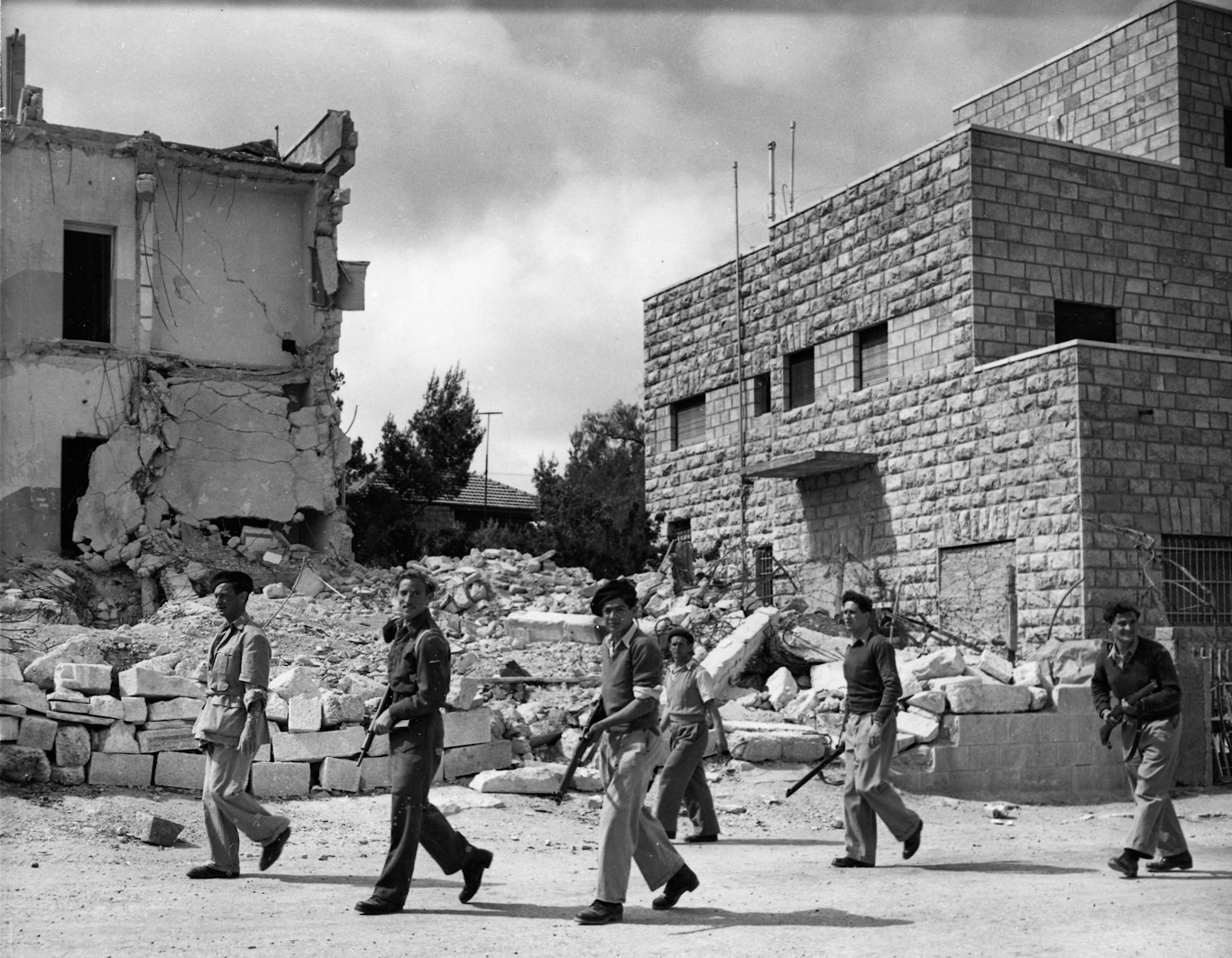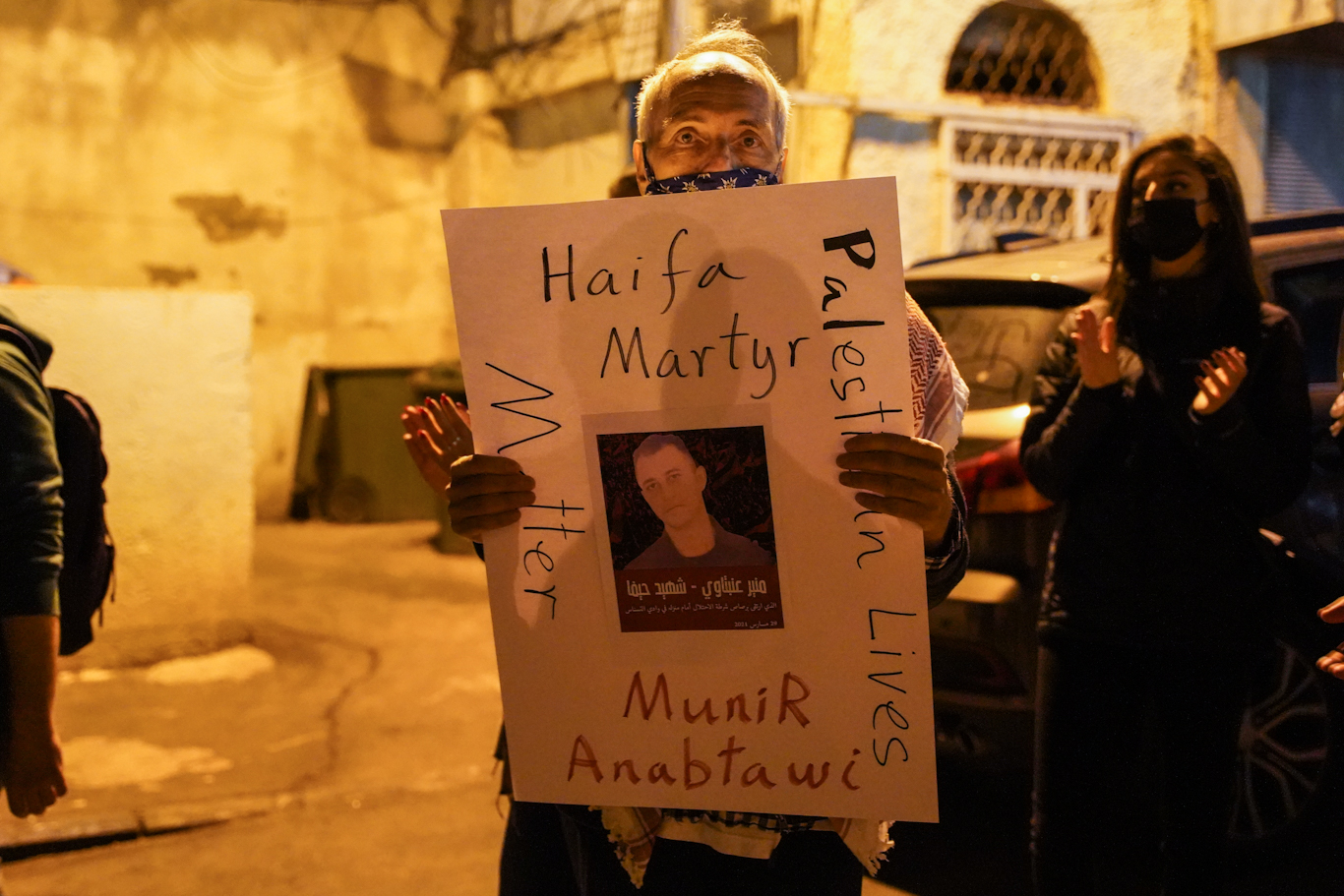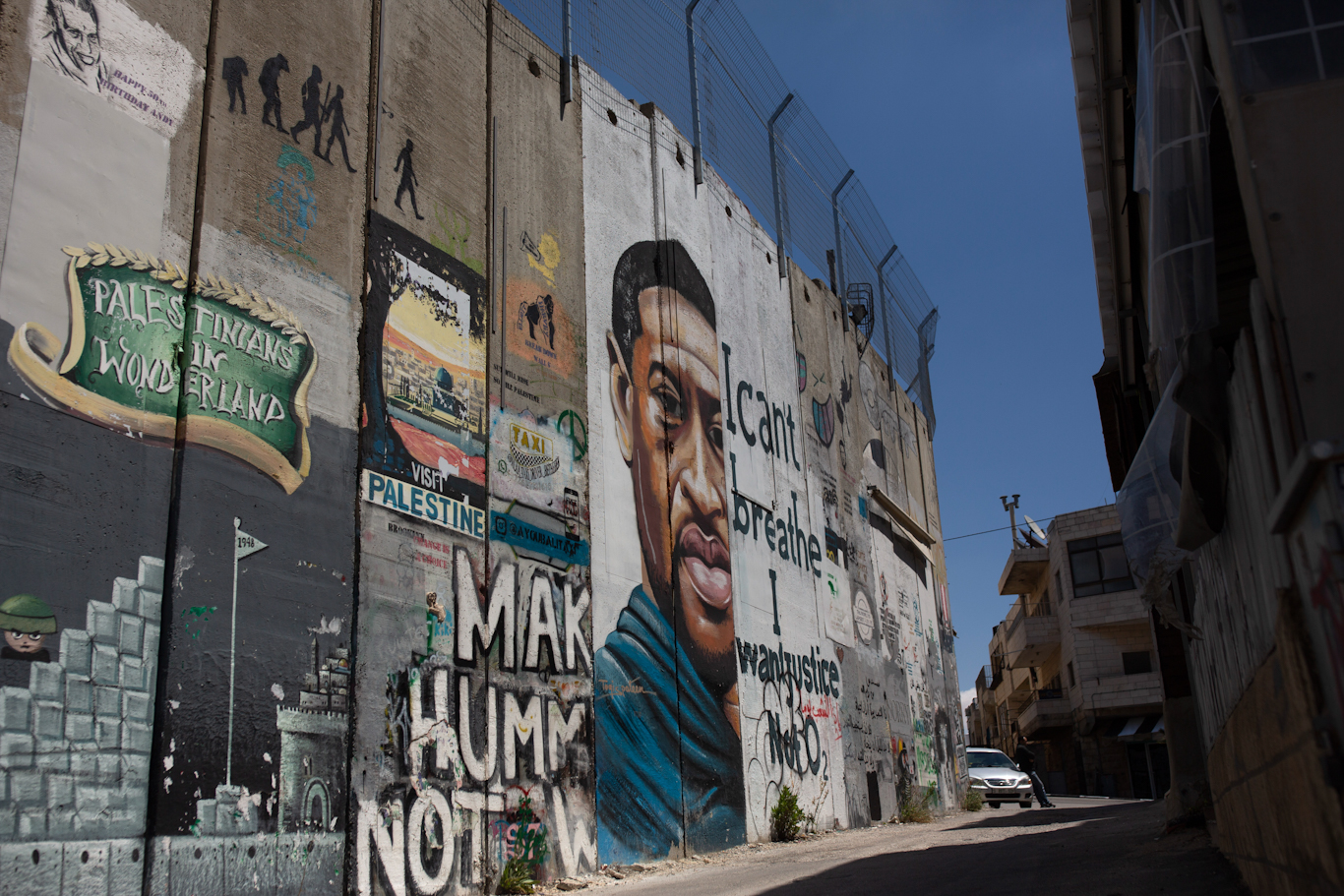April 15th, 2021
By Jessica Buxbaum
In the US, policing can be traced back to nineteenth-century slave patrols. In Israel, security forces have roots in Haganah, a Zionist militia group involved in the ethnic cleansing of Palestine.
HAIFA, ISRAEL — Israeli state violence manifests in several ways—police killings, home demolitions, displacement and detentions—but each is grounded in the same colonialist ideology spanning decades.
In the U.S., policing can be traced back to the nineteenth century slave patrols designed to control and suppress Black people. In Israel, the Israel Defense Forces (IDF) and Israeli security agency, Shin Bet, have roots in the Haganah, a Zionist militia group involved in the ethnic cleansing of Palestine (known as the Nakba) before Israel became a state.
The Haganah’s off-shoot organizations—Irgun and Lehi—committed atrocities like the Deir Yassin massacre. On April 9, 1948, these Zionist fighters stormed the village of Deir Yassin, “executed over 100 men, women and children, and then burned their dead bodies.”
Israeli history of the Haganah often tries to separate it from the right-wing Irgun and Lehi paramilitary organizations, but massacres were a core part of the Haganah’s strategy. During the Nakba, the Haganah carried out bombings, executions, and even castration.
Miko Peled, a human rights activist whose father served in the Israeli Army and was part of the Haganah, considers the Zionist group a terrorist organization.
“Their entire existence was to execute the ethnic cleansing of Palestine. So, there’s no way to execute ethnic cleansing other than [by] terrorizing the population,” Peled said, adding:
The Haganah became the Israeli Army after May of 1948, but in terms of their mode of operations and ideology, they were really just the same terrorist organization glorified now as an army.”

While the IDF originates from the Haganah, the Israel Police derives from the Palestine Police Force. Established by the British, the organization grew from a primarily Palestinian institution at its founding in 1920 to one mostly comprised of British and Jewish officers by 1948.
Specifically, the Jewish forces dominated the Notrim, a branch of the service defending Jewish settlements. The majority of its members were recruited from the Haganah. The Notrim became what is known today as the Israeli Military Police. Between 1947 and 1948, Palestinian police officers joined Arab forces defending Palestine, while Jewish police collaborated with Zionist militias.
Peled explained that these interconnections between the different police and military forces still exist:
The police, the military, and the Shabak [Shin Bet] all work together. A lot of officers retire from the military and go to the police or the Shabak. They were all raised on the same ideology and the mode of operation is Palestinian lives don’t matter.”
The violence and racist beliefs of slave patrols, the Haganah, and the Palestine Police Force can still be witnessed today in American policing and the Israeli Army.
The police brutality crisis in Israel-Palestine
On March 29, Munir Anabtawi’s mother called police to help subdue her mentally ill son, who had a knife, in their home in the Wadi Nisnas neighborhood of Haifa. The police arrived but instead of diffusing the situation, an officer shot Anabtawi twice in the chest, killing him.
The incident sparked renewed concern over the Israel Police’s treatment of marginalized communities, specifically of Palestinians with and without Israeli citizenship.
Anabtawi, 33, was a Palestinian citizen of Israel. His killing is still under investigation, but the officer who fatally shot him is now back at work after Israel’s Ministry of Justice accepted his claim he shot in self-defense. According to the officer, Anabtawi tried to stab him. A knife was found at the scene.

Both Public Security Minister Amir Ohana and the Commander-in-Chief of Police have come out in support of the officer.
Alber Nahas, the lawyer for the Anabtawi family, disputes the police’s self-defense reasoning. He argues the police are professionals and should know how to de-escalate a confrontation without killing an individual.
“They could have shot him in the legs, not the chest,” Nahas told MintPress.
The Israel Police placed a gag order on Anabtawi’s case to stop further reporting. Anabtawi’s family requested an autopsy be performed by their own representative. Yet Nahas said the autopsy’s results remain unknown as a result of the gag order.
A day after Anabtawi’s death, crowds waved Palestinian flags outside his family’s home in protest of the police killing.
In recent weeks, massive demonstrations have erupted across Palestinian communities inside Israel over police brutality against Palestinian citizens of Israel and law enforcement’s mishandling of violence stemming from organized crime.
Video footage from a February protest in Umm al-Fahm in northern Israel shows police officers using excessive force against participants. The severe use of tear gas and stun grenades by police resulted in a protester requiring head surgery.
In February, Ahmad Hejazi, a Palestinian citizen of Israel and a bystander, was fatally shot when police opened fire during a crime scene.
These actions have pushed human rights organizations such as Adalah (The Legal Center for Arab Minority Rights in Israel) and Palestinian members of Israel’s parliament to charge that police officers view Palestinian citizens as enemies of the state.
“The killing of 33-year-old Munir Anabtawi is merely the continuation of the aggressive treatment practiced by the police toward Arab citizens,” Ayman Odeh — head of the Joint List, a coalition of Israel’s main Arab political parties — told the Times of Israel. “The police see Arab citizens as enemies, not equal citizens.”
According to the Mossawa Center, an advocacy organization for Palestinians in Israel, Israeli police have killed 62 Palestinian citizens of Israel, and 47 of those deaths can be attributed to racism. Suha Salman Mousa, Mossawa’s executive director, explained how this violence is rooted in racism.
Since 2000 we see that the chief of police, the police officers, and the whole system are dealing with Arab citizens of Israel in a different way. And this is part of the racism we suffer from. We suffer from racism in the form of police brutality, we suffer from racism in laws approved by the Knesset [Israeli parliament], and we suffer from racism with home demolitions. We suffer from racism in all aspects of life, and one of them is police brutality.”
Black Lives Matter, Palestinian Lives Matter
Last year, in the wake of the horrific police murders of Breonna Taylor and George Floyd and the resurgence of the Black Lives Matter movement, Palestine-Israel was having its own Palestinian Lives Matter movement.
On May 30, 2020, Israeli border police fatally shot Iyad Hallak, a Palestinian man with autism, in Jerusalem. The reason for the deadly firing? Officers suspected Hallak was armed. It was revealed after his death that he wasn’t carrying a weapon.
Palestinians and Israeli activists made a connection between Floyd and Hallak’s deaths. Floyd’s face was painted on the Apartheid Wall, the barrier separating the West Bank and Israel. Activists demonstrating against Hallak’s killing in Tel Aviv and Jerusalem held signs reading “Palestinian Lives Matter,” an obvious reference to the ongoing civil rights struggle in the U.S.

Anabtawi’s killing brings back to mind Hallak’s. “[Anabtawi] could have been taken over without live fire, according to his sister,” Palestinian member of the Knesset Ahmad Tibi said. “The names Iyad Hallak and Mustafa Yunis Zel come up again. Very light hand on the trigger.”
Just as Black individuals are seen as suspects by American police, so are Palestinians by Israeli forces.
“Whenever the police see an Arab, he immediately becomes a target,” one of Hallak’s relatives, Hatem Awiwi, told Al-Monitor days after his death.
For Mousa, police violence in the U.S. and Israel-Palestine is the product of a shared pervasive issue: “If you compare it with Black Lives Matter and the police officers in the U.S., it’s racism. It’s almost the same.”
An American-Israeli police alliance
American police killed 1,127 people in 2020 — 28% of those killed were Black; the U.S. population is just over 12% Black.
On the other side of the world — in Palestine-Israel — the numbers tell a similar story. In 2019, 13 people are known to have been killed by the police, 11 of them were Palestinians and two others were of Ethiopian descent.
Despite the difference in statistics, an ongoing exchange of militant practices and abusive tactics entwines the two organizations together.
In 2002, the Jewish Institute for National Security Affairs (JINSA) launched a law enforcement exchange between Israeli and American police forces. Its success birthed an official exchange program between the allies, under which every year hundreds of American police officers travel to Israel for training with military and police personnel. Thousands more participate in conferences and workshops led by Israeli officials in the U.S.
According to a 2018 report by Researching the American-Israeli Alliance (RAIA), while the exchanges are touted as an opportunity for American police to partner with a foreign ally and gain invaluable counter-terrorism experience, they actually reinforce discriminatory practices embedded in law enforcement. Specifically, these exchanges enhance strategies of surveillance, racial profiling, and forceful suppression of protests among American police officers. RAIA wrote:
Upon their return, U.S. law enforcement delegates implement practices learned from Israel’s use of invasive surveillance, blatant racial profiling, and repressive force against dissent. Rather than promoting security for all, these programs facilitate an exchange of methods in state violence and control that endanger[s] us all.”
Overall, this “Israelization” of the U.S. police leads to increased militarization of an already heavily militarized police force.
In Israel, citizens are obliged to spend two years in the army. The Anabtawi family’s lawyer said he would like to believe police officers coming from the IDF understand the difference between a citizen and an enemy. Alber Nahas explained:
When you are with the army, you are fighting the enemy. If you are fighting the enemy, it’s easier to shoot, to kill the enemy, but the police should not look at the Arab people, the citizens inside the country, as enemies. So, the government should better educate the police so this doesn’t happen.
Because the statistics are saying to us that there are more Arabs who were killed by policemen than non-Arabs. And this shouldn’t be accepted as a human being.”













No comments:
Post a Comment